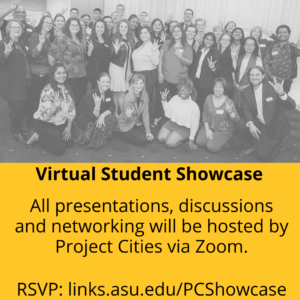Our “News” feed is a great way to see how we’ve celebrated the students in Project Cities’ showcase events in the past. This semester we’re hosting our first-ever fully virtual showcase event, and we’ve received a few questions about how we’re making the event special while practicing social distancing. Click “read more” to learn what you can expect at this semester’s showcase event and catch previews of the project topics.
Event Details:
April 29, 8:30am – 2:30pm
Pre-register for the link to virtual event space
links.asu.edu/PCShowcase_RSVP
Three sets of virtual “rooms,” each configured to facilitate a different “type” of interaction:
- A “main stage” for students to present key findings and recommendations to the partner community and general public.
- Virtual “poster gallery” breakout rooms for a Q&A session and in-depth dialogues about the students’ work.
- A virtual “lobby” that attendees can visit during breaks, for informal discussions and networking with others. Ask the host for a sidebar room for one-on-one conversations.
- Stick around after the closing remarks for an informal closing reception.
Project profiles:
A total of 6 student groups will share their findings on 5 collaborative projects over the course of the event through presentations and Q&A “poster” sessions.
About the project: Clarkdale’s historic downtown corridor and 89A commercial corridor are both identified as opportunities for development and revitalization. Students conducted extensive public outreach to generate character and design guidelines, with a focus on preserving the community’s historic character, while also developing opportunities to serve the need for both recreation and business activity.
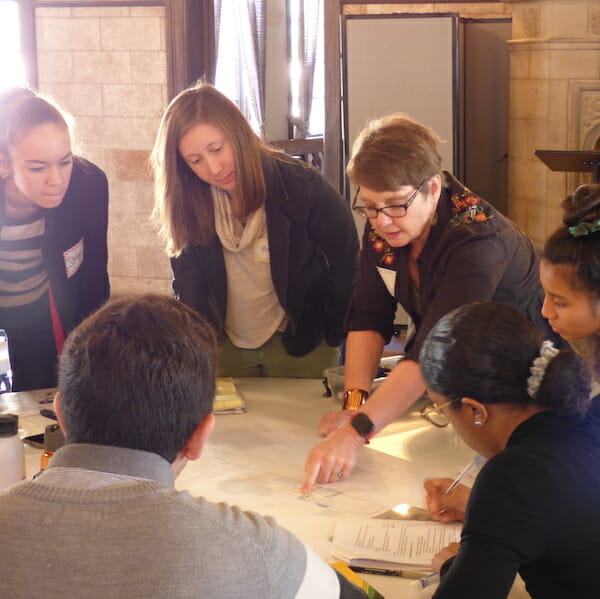
Project: Historic Downtown District Revitalization Plan
Community: Town of Clarkdale
Class: PUP580: Planning Workshop
School: School of Geographic Sciences and Urban Planning
Faculty: Meagan Ehlenz and Kim Kanuho
Students: 17, Graduate
Goal: Develop guiding strategies to advance Clarkdale’s downtown revitalization and 89A corridor development efforts.
Project: Water Conservation and Shortage Response Strategy
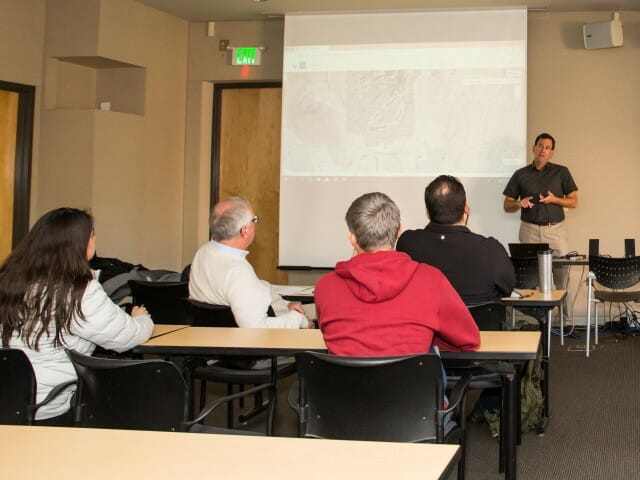
Community: City of Peoria
Class: ERM494/598: Water Resource Management
School: Ira A Fulton School of Engineering
Faculty: Larry Olson
Students: 9, Graduate and Undergraduate
About the project: If the current, severe drought continues, the Central Arizona Project’s (CAP) water deliveries could be negatively impacted. To proactively address this challenge, the City of Peoria is exploring strategies to increase water conservation behavior among residents, plan for future need, and, developing shortage response plans, should conservation fail.
Goals: Apply technical knowledge and management expertise to establish guiding strategies for proactive water conservation measures and potential shortage response plans.
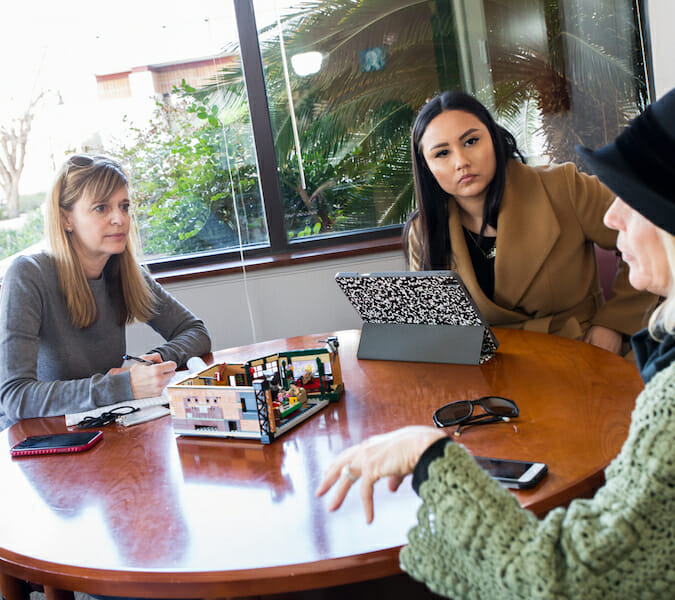
Project: Water Conservation and Shortage Response Messaging
Community: City of Peoria
Class: STC 593: Applied Project
School: New College
Faculty: Majia Nadesan
Students: 1 Masters Capstone Student
About the project: Masters Capstone student, Denise, carried on the Fall 2019 crisis communication class’ work forward to the next level by developing digital content around water conservation initiatives and conducting a user experience analysis of the program’s web presence.
Goals: Asses the effectiveness of messaging campaigns developed by her peers and identify how to get citizens to leverage digital media to convince residents to improve their water usage patterns and help mitigate possible drought in Peoria.
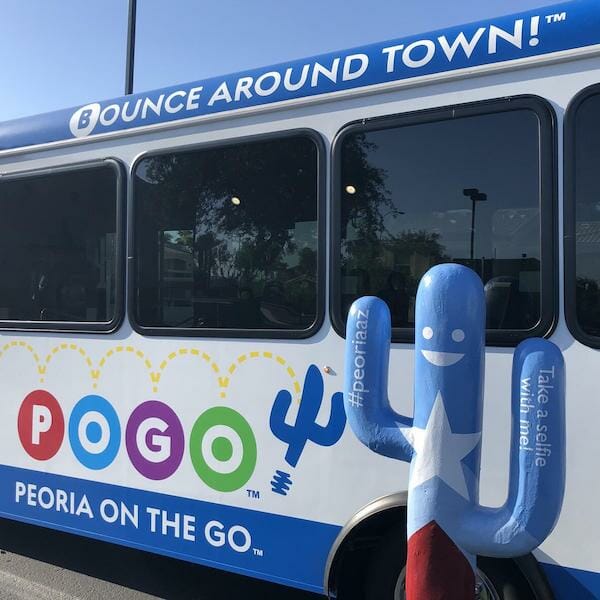
Project: Transit Circulator Best Practices
Community: City of Peoria
Class: PUP598: Transportation and Land Use Planning
School: School of Geographic Sciences and Urban Planning
Faculty: David King
Students: 2, Graduate
About the project: Master students conducted a reference point study of peer communities to identify the best practices in managing transit circulator programs locally and globally.
Goals: Analyze a sample of other transit systems to evaluate service delivery to Peoria’s residents via the POGO transit circulator. Identify issues and provide recommendations to remedy any potential gaps in the service.
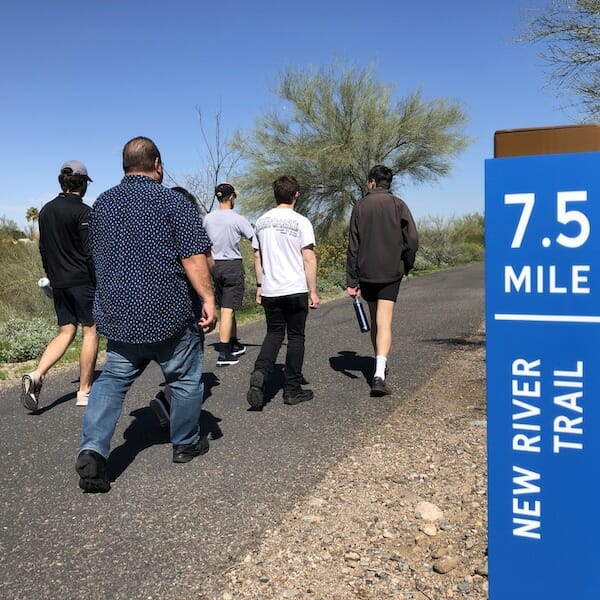
Project: Skunk Creek Recreation Corridor Plan
Community: City of Peoria
Class: FSE 104/404: EPICS Gold
School: Fulton Schools of Engineering, EPICS program
Faculty: Joshua Loughman, Jared Schoepf
Students: 5, Undergraduate
About the project: Skunk Creek is a large floodplain, bordered by two multi-use paths, fully bisecting southern Peoria, and connecting to neighborhoods, public parks and facilities, business offices, and a large retail and entertainment district. Past planners didn’t see the floodplain’s value beyond its usefulness as a stormwater management feature—but current City leadership now recognizes the incredible and unique opportunity to explore resilient recreation-oriented development in the Skunk Creek corridor.
Goals: Students carried forward the work of the prior semester’s students, refining initial recommendations to a more thoroughly vetted shortlist, then conducting feasibility assessments of several proposed developments through a community-oriented, civil engineering lens.
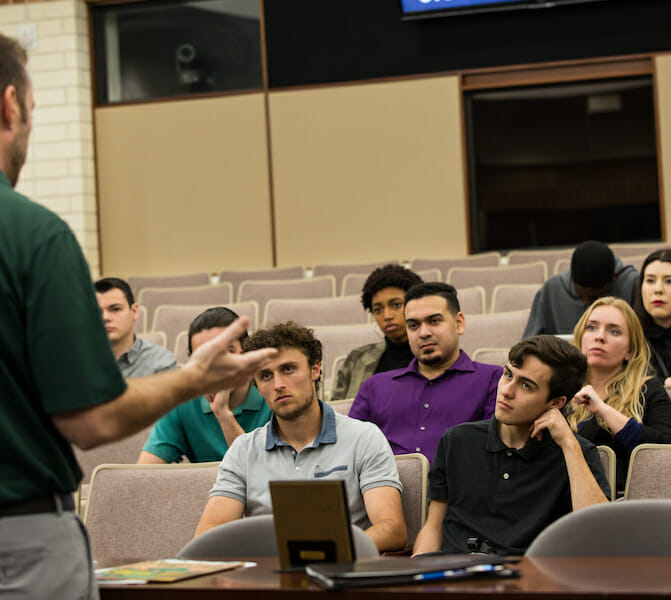
Project: Sustainability Plan Review
Community: City of Peoria
Class: SOS321: Policy and Governance for Sustainable Systems
School: School of Sustainability
Faculty: Candace Carr Kelman
Students: 40, Undergraduate
About the project: Peoria is a sustainability champion in the Valley of the Sun; the community released its first sustainability plan in 2009 and version 2.0 in 2013. Students dissected and analyzed Peoria’s Sustainability Action Plan, through a wide-reaching benchmarking study that compared it to similar municipal sustainability plans across the United States.
Goals: Conduct a wide-reaching literature review of municipal sustainability plans in Arizona and across the country; leverage the course curriculum on urban dynamics and governance systems to develop recommendations for strengthening the City’s sustainability initiatives further.
—
Make sure you register in advance to receive the Event Guide via email. The Event Guide contains clickable links to each of the sessions and rooms on the day’s agenda. Pre-register at links.asu.edu/PCShowcase_RSVP
The Event Guide will also contain project profiles, community information, and helpful resources on using the Zoom platform. If you miss the pre-registration window, you can still check-in at the registration “table” in the “lobby” at links.asu.edu/PCShowcase_Lobby. Check-in begins at 8:30 am on 4/29.
